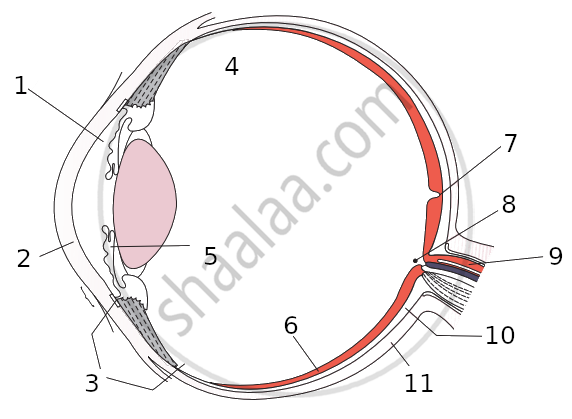Advertisements
Advertisements
प्रश्न
Choose the Odd One Out:
विकल्प
Choroid
Cilîary part
Iridial part
Cornea
उत्तर
Cornea
APPEARS IN
संबंधित प्रश्न
Describe the anatomy of the human eye.
A person got his eyes tested by an optician. The prescription for the spectacle lenses to be made reads :
Left eye : +2.50 D
Right eye : +2.00 D
State whether these lenses are thicker in the middle or at the edges.
Give the scientific names of the following parts of the eye:
a hole in the middle of the iris.
What changes take place in the shape of eye-lens:
when the eye is focused on a near object?
Which of the following controls the amount of light entering the eye?
(a) ciliary muscles
(b) lens
(c) iris
(d) cornea
The animals of prey have:
(a) two eyes at the front
(b) two eyes at the back
(c) two eyes on the sides
(d) one eye at the front and one on the side
Mention if the following statement is true (T) or false (F) Give reason.
Ciliary muscles regulate the size of the pupil
Mention if the following statement is true (T) or false (F) Give reason.
yellow spot of the retina is the region of colour vision
Give the main function of the following:
Lachrymal glands
Explain the Term: Accommodation in the eye
Give Technical Term:
Name the part of the retina on which an object is focused for the clearest vision.
Choose the Odd One Out:
Draw a scientifically correct labelled diagram of a human eye and answer the questions based on it:
- Name the type of lens in the human eye.
- Name the screen at which the maximum amount of incident light is refracted?
- State the nature of the image formed of the object on the screen inside the eye.
Write an Explanation.
Minimum distance of distinct vision
The black opening between the aqueous humour and the lens is called ____________.
Select the option with incorrect identification:

Arrange and rewrite the term in group in correct order to be in a logical sequence, beginning with the term that is underlined:
Pupil, Aqueous humour, Retina, Vitreous humour.
Match the following.
| Column - I | Column - II | ||
| 1 | Retina | a | Path way of light |
| 2 | Pupil | b | Far point comes closer |
| 3 | Ciliary muscles | c | near point moves away |
| 4 | Myopia | d | screen of the eye |
| 5 | Hypermetropia | e | Power of accomadation |
Assertion (A): Rods and Cones are photoreceptors in the sclera of eyeball.
Reason (R): Rods are sensitive to dim light.
